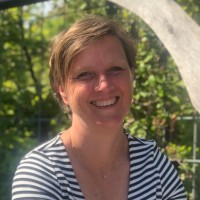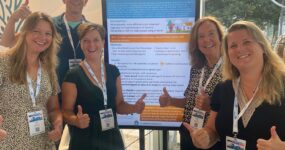Artikel: International Delphi study on terminology, organisation, and outcomes of geriatric rehabilitation for older people living at home
13 augustus 2025
Onderzoeksvraag: To reach consensus on terminology, organisational aspects, and outcome domains of geriatric rehabiliation for older people living at home.

Astrid Preitschopf
Astrid Preitschopf
GRZPLUS (Omring)’s fysiotherapeut Astrid Preitschopf is als Science Practitioner (promovendus)* bij GRZPLUS binnen de ontwikkelpraktijk van het Universitair netwerk Ouderenzorg Amsterdam (UNO Amsterdam). Ze is verbonden aan het Bijzonder Lectoraat Geriatrische Revalidatie Omring/Inholland, onder leiding van bijzonder lector Marije Holstege. Astrid doet promotieonderzoek naar de ambulantisering (revalidatie vanuit huis) van geriatrische revalidatie (GR). Geriatrische revalidatie (GR) kan zowel klinische als in de thuissituatie gegeven worden, ook wel ambulante geriatrische revalidatie (AGR) of in het Engels ‘home-based’ GR (HBGR) genoemd.

Marisa Vaz
Marisa Vaz is Science Practitioner (promovendus) binnen GRZPLUS. Dit houdt in dat ze twee dagen in de week als ergotherapeut werkt bij De Zorgcirkel en twee dagen in de week als onderzoeker, verbonden aan het Universitair Netwerk Ouderenzorg Amsterdam (UNO Amsterdam). Zij doet ook onderzoek naar de ambulante geriatrische revalidatie.
Onderzoek:
Internationally, many differences are observed regarding the practice of geriatric rehabilitation for older people living at home. To improve international collaboration and research on this topic, we aimed to reach a consensus on terminology, organisational aspects, and outcome domains to focus on.
Doel:
To reach consensus on terminology, organisational aspects, and outcome domains of geriatric rehabilitation for older people living at home.
Methode:
We conducted a three-round online Delphi study among 60 (Home-based) geriatric rehabilitation experts from 14 countries. In the first round, we collected diverse perspectives and input through statements and questions.
In the subsequent rounds, participants rated statements on a 5-point Likert scale. Each statement could be accompanied by written feedback. After each round, results were presented anonymously to the participants, and statements on which no consensus was reached were rephrased.
Consensus was defined as 70% or more participants (fully) agreeing with a statement.
Resultaten:
60, 52, and 46 experts completed rounds 1, 2 and 3, respectively. After two rounds, we reached a consensus on ten statements and on the remaining four in the last round.
A consensus was reached on the terminology used (i.e., home-based geriatric rehabilitation) and on several organisational aspects (e.g., essential aspects to consider for starting home-based geriatric rehabilitation and the importance of a knowledgeable case manager). Lastly, experts agreed that participation and activity are the most important outcome domains to focus on.
Conclusie:
Through an international Delphi study, we reached consensus on various important aspects of home-based geriatric rehabilitation. These outcomes provide a basis for further development of this emerging field.
Onderzoekslocatie:
Meer informatie en contact
Vragen over dit onderzoek? Stel ze aan Astrid Pleitschopf
- Het promotieonderzoek van Astrid Preitschopf
- Bijzonder Lectoraat Geriatrische Revalidatie Omring/Inholland
Astrid’s artikelen
- Astrid’s vierde artikel binnen het promotieonderzoek met de titel: ‘International Delphi study on terminology, organisation and outcomes of geriatric rehabiliation for older people living at home’ verscheen in het vooraanstaande tijdschrift European Geriatric Medicine (Volume 16, Issue 3 , 4 June 2025)
- Astrid’s derde artikel binnen het promotieonderzoek met de titel: ‘Home-based geriatric rehabilitation after inpatient rehabilitation: a redesign and feasibility study’ verscheen in het vooraanstaande tijdschrift BCM Geriatrics ((2025) 25:398)
- Astrid’s tweede artikel binnen het promotieonderzoek met de titel: ‘The design elements of outpatient geriatric rehabilitation from patient, healthcare professional, and organizational perspective; A qualitative study.’ verscheen in het vooraanstaande tijdschrift Disability and Rehabilitation (Volume xx, Issue xx, July 2024).
- Astrid’s eerste artikel binnen het promotieonderzoek met de titel: ‘Effectiveness of Outpatient Geriatric Rehabilitation After Inpatient Geriatric Rehabilitation or Hospitalisation: A Systematic Review and Meta-analysis’ verscheen in het vooraanstaande tijdschrift Age and Ageing (Volume 52, Issue 1, January 2023).
Lees hier Astrid’s vierde artikel, in het Engels:
Ga naar de PDF inhoud
* Science Practitioners (SP) zijn master opgeleide professionals uit een zorgorganisatie of gepromoveerde onderzoekers die de specifieke taak hebben om zorg en wetenschap met elkaar te verbinden. Zij combineren hun onderzoekswerk met het hun praktijkwerk en werken minimaal één dag per week hieraan. Als vliegwielfunctie halen ze praktijkvragen op, verbinden ze mensen en organisaties, ondersteunen ze bij het maken van onderzoeksvoorstellen en helpen ze nieuwe kennis in praktijk te brengen. Astrid werkt bijvoorbeeld twee dagen als fysiotherapeut en doet twee dagen onderzoek.